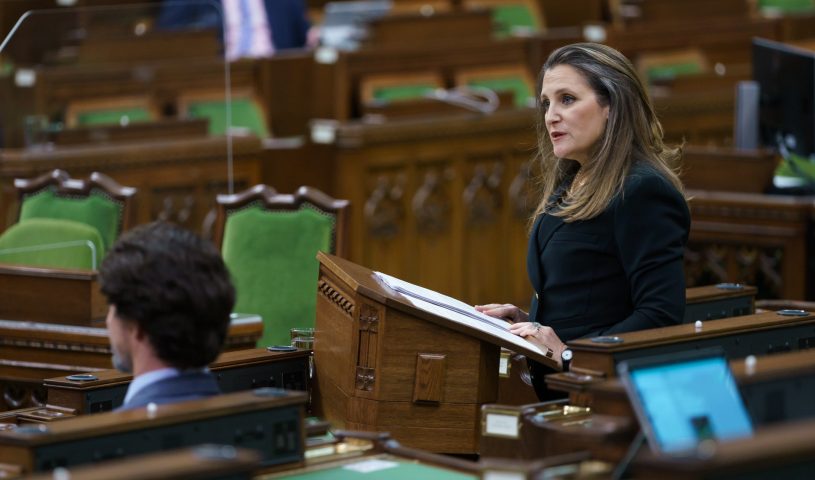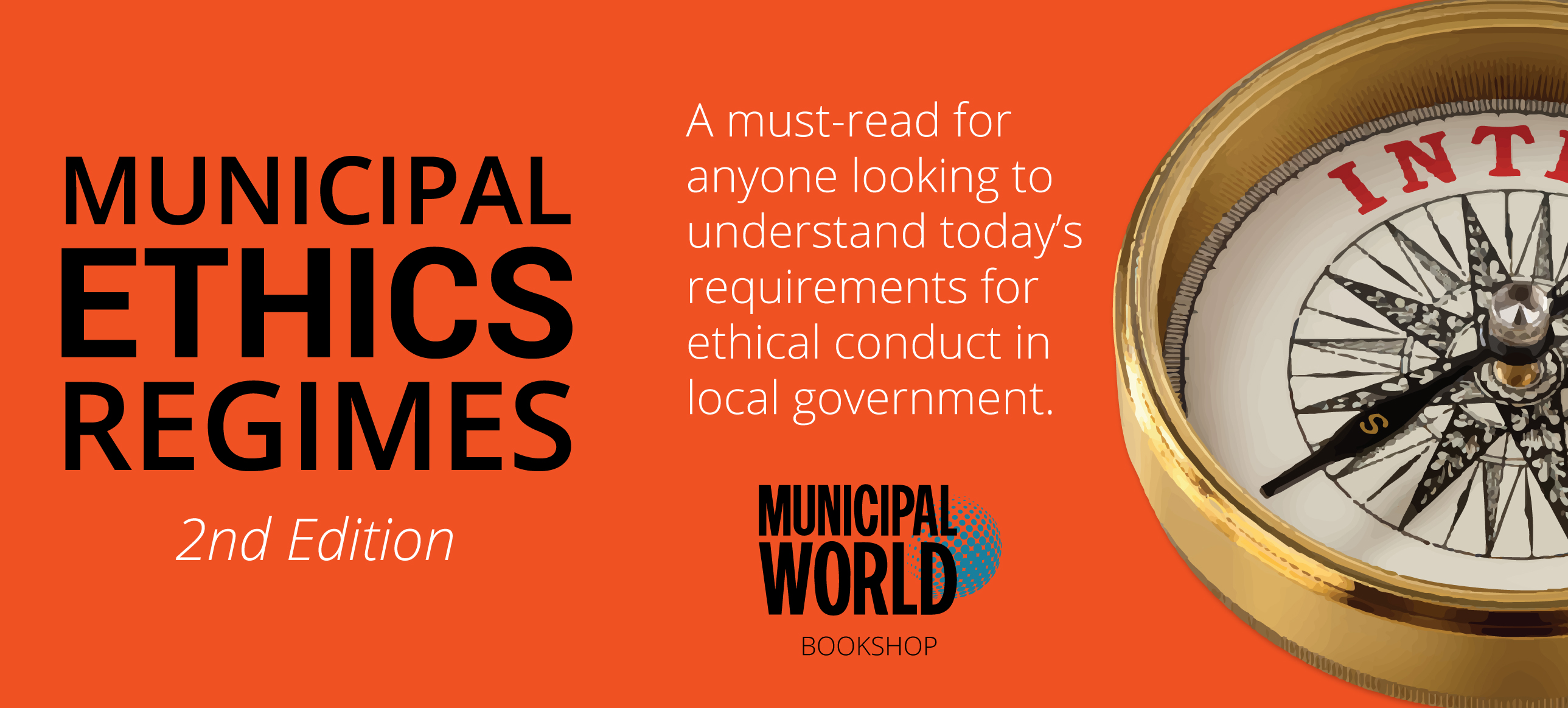FCM president responds to Budget 2021

On April 19, Deputy Prime Minister and Minister of Finance Chrystia Freeland released Budget 2021, the federal government’s plan to finish the fight against COVID-19 and ensure a robust economic recovery that brings all Canadians along.
Following the release of the 2021 budget document – officially, Budget 2021: A Recovery Plan for Jobs, Growth, and Resilience – Freeland made clear the battle against COVID-19 remains the government’s top priority.
“This budget is about finishing the fight against COVID-19. It’s about healing the wounds left by the COVID-19 recession,” Freeland said. “And it’s about creating more jobs and prosperity for Canadians in the days – and decades – to come.”
Garth Frizzell, president of the Federation of Canadian Municipalities (FCM) and councillor of the City of Prince George, B.C., weighed in on the government’s efforts, focusing attention on how local governments across the country will be at the forefront of pandemic recovery.
“Municipalities are gearing up to drive a strong national recovery – in cities and communities of all sizes across the country. This budget responds to some of FCM’s key recommendations, including expanding support for small and rural communities to become more resilient in the face of climate extremes, and new investments in broadband connectivity,” Frizzell said. “The measures here to spur growth in hard-hit western communities are critical, particularly the investments in trade infrastructure and regional economic growth. We welcome the steps taken to support the Rapid Housing Initiative, but to meet our shared goal of ending chronic homelessness much more will need to be done.”
Budget 2021 Highlights
The Government of Canada’s top priority remains protecting Canadians’ health and safety, particularly during this third, aggressive wave of the virus and its variants. Vaccine rollout is underway across Canada, with federal government support in every province and territory. Budget 2021 invests in Canada’s bio-manufacturing and life sciences sector to rebuild domestic vaccine manufacturing capacity, and has a plan to put in place national standards for long-term care and mental health services.
Budget 2021 is a plan to bridge Canadians and Canadian businesses through the crisis and towards a robust recovery. It proposes to extend business and income support measures through to the fall and to make investments to create jobs and help businesses across the economy come roaring back. It will support almost 500,000 new training and work opportunities including 215,000 opportunities for youth; support businesses in our most affected sectors such as tourism and arts and culture; and accelerate investment in digital transformation of small and medium-sized businesses. Budget 2021 is a plan that puts the government on track to meet its commitment to create one million jobs by the end of the year.
Budget 2021 makes a generational investment to build a Canada-wide early learning and child care system. This is a plan to drive economic growth, a plan to increase women’s participation in the workforce, and a plan to offer each child in Canada the best start in life. This plan will aim to reduce fees for parents with children in regulated childcare by 50 percent on average, by 2022, with a goal of reaching $10 per day on average by 2026, everywhere outside of Quebec. Budget 2021 will invest almost $30 billion over the next five years and provide permanent ongoing funding, working with provincial and territorial, and Indigenous partners to support quality, not-for-profit childcare, and ensuring the needs of early childhood educators are at the heart of the system.
Budget 2021 is also a plan for a green recovery that fights climate change, helps more than 200,000 Canadians make their homes greener, builds a net-zero economy by investing in world-leading technologies that make industry cleaner, helps Canada reach its goal of conserving 25 per cent of our lands and oceans by 2025, and creates good middle-class jobs in the green economy along the way.
The pandemic has laid bare long-standing inequities in our economy. Budget 2021 is an inclusive plan that takes action to break down barriers to full economic participation for all Canadians. The budget will establish a $15 federal minimum wage; support more than 35,000 affordable homes, especially for the most vulnerable Canadians; take action to end gender-based violence; ensure Canada has one of the largest support packages for youth in the world; support entrepreneurs from diverse groups; address systemic racism in our society; lift over 100,000 people out of poverty; and make an historic investment in Indigenous peoples and reconciliation.
The government is committed to reducing the federal debt as a share of the economy over the medium-term and unwinding COVID-19-related deficits. This framework is prudent and sustainable, with the federal debt-to-GDP ratio expected to fall to 49.2 percent by 2025-26 and the deficit to reach 1.1 per cent of GDP that same year, a lower deficit ratio than was forecast – in December 2019 prior to the onset of COVID-19 – for 2019-20 and 2020-21.
Budget 2021 Quick Facts
Budget 2021 includes $101.4 billion over three years in proposed investments as part of the Government of Canada’s growth plan that will create good jobs and support a resilient and inclusive recovery. Key measures include:
- Establishing a Canada-wide early learning and childcare system, in partnership with provincial, territorial, and Indigenous partners, which will help all families access affordable, high-quality, and flexible childcare no matter where they live, and no longer shoulder the burden of high child care costs. The budget proposes new investments totalling almost $30 billion over the next five years and $8.3 billion ongoing to support this vision.
- Extending emergency supports to bridge Canadians and Canadian businesses through to recovery, including:
- Extending the Canada Emergency Wage Subsidy, the Canada Emergency Rent Subsidy and Lockdown Support until September 25, 2021.
- Extending the number of weeks available for important income support for Canadians such as the Canada Recovery Benefit and the Canada Recovery Caregiving Benefit.
- Enhancing Employment Insurance sickness benefits from 15 to 26 weeks.
- Increasing Old Age Security for seniors age 75 and older to provide them with better financial security.
- Supporting small and medium-sized businesses through several transformative programs, such as:
- A new Canada Digital Adoption Program that will assist over 160,000 businesses with the cost of new technology. And it will provide them with the advice they need to get the most of new technology with the help of 28,000 young Canadians who will be trained to work with them.
- Allowing Canadian small businesses to fully expense up to $1.5 million in capital investments in a broad range of assets, including digital technology and intellectual property. This represents an additional $2.2 billion investment in the growth of Canada’s entrepreneurs over the next five years.
- Revitalizing Canada’s tourism sector through $1 billion to help tourism businesses recover and support festivals and cultural events that provide jobs and growth in many of our cities and communities.
- Supporting women, Black Canadians, and other underrepresented entrepreneurs who face barriers to launching and owning businesses through $300 million to enhance initiatives like the Black Entrepreneurship Program and the Women Entrepreneurship Strategy.
- Establishing a $15 federal minimum wage.
- Enriching the Canada Workers Benefit, which will support about 1 million more Canadians and lift nearly 100,000 people out of poverty. This will result in additional support of $8.9 billion over six years for Canada’s low-wage workers.
- Helping to build, repair, and support 35,000 affordable housing units for vulnerable Canadians through an investment of $2.5 billion and a reallocation of $1.3 billion in existing funding.
- Investing $17.6 billion in a green recovery that will help Canada to reach its target to conserve 25 per cent of Canada’s lands and oceans by 2025, exceed its Paris climate targets and reduce emissions by 36 per cent below 2005 levels by 2030, and move forward on a path to reach net-zero emission by 2050.
- Closing the gaps between Indigenous and non-Indigenous peoples, supporting healthy, safe, and prosperous Indigenous communities, and advancing meaningful reconciliation with First Nations, Inuit, and the Métis Nation through an historic investment of over $18 billion. MW
✯ Municipal World Insider and Executive Members: You might also be interested in Garth Frizzell’s statement on the Budget 2021: FCM statement on the 2021 federal budget. Note that you can now access the complete collection of past articles (and more) from your membership dashboard.
Related resource materials:



